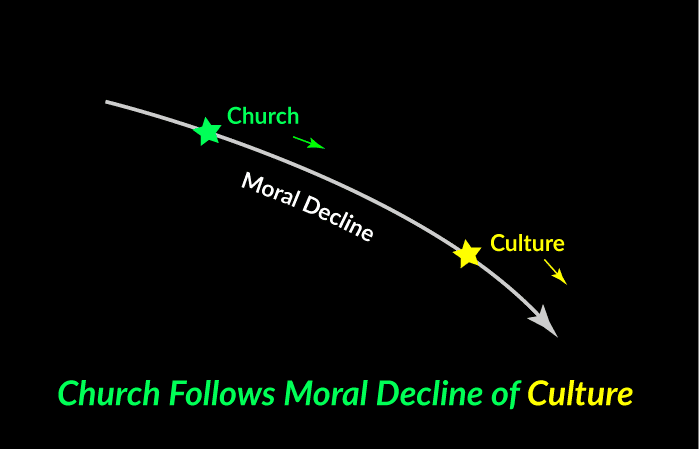
This past week I read a headline of an article titled, “Why Model Was Half-Naked” on a national news website. I wonder how much time the author spent trying to choose the wording of the title. The obvious message is that the model wanted to be half-naked for some reason. It is also rather obvious that the editors of the news website knew that title of the article was sensational. Most people would feel shame but not the model. We do not need to read Revelation 16:15 to know that. The title was a carefully crafted magnet to entice people. I have to admit that I have come to expect such blatant seduction designed to trap an audience to boost website ratings. Such behavior is not new. But I have to admit I was more disturbed with the title, “Should You Feel Shame For Missing Church?” on another website.
Living In The Age of Grace
The author of the article “Should You Feel Shame For Missing Church?” wrote,
“If we could read people’s minds on Sunday mornings, we’d see all kinds of interesting thoughts . . .
– I’m tired.
– This is my only day to sleep in.
– People at church are hypocrites.
– They won’t even notice I’m not there.
– The ceiling would cave in if I walked through those doors.
– I know I should go, but I don’t feel like it.”[1]
Now she left one off that I hear often as a pastor, “I was sick!” Now we know that some people are legitimately sick and some are chronically sick but have you ever wondered? Then she added,
Sound familiar? I’ve been there. This article is for you, whether you attend regularly but feel guilty when you need to miss a week, or whether you do not go to church at all. I do go to church on Sunday mornings (but, I’ll admit, not to every service our church offers). I love it and I honestly don’t know what I’d do without it—but I’ll be the first person to say that you should not feel shame for missing it.[2]
One wonders what is included when the author says, “when you need to miss?” We suspect that she has good intentions for her article. There are some who have to miss church and they seriously regret missing. But the author seems to be concerned about those who want to miss church. Later in the article the author is compassionate and calls the reader to obedience from the heart. Yet, the author is soft on the call to obedience, because her primary thrust is to help her reader feel good or “okay” about missing church.
How did you react to the comment that Christians should not feel any shame for missing church? I wonder how many Christians agree. Do you?
Next, she says that Christians should not feel any shame for missing church since we live in an age of grace.
Because shame has no place in a relationship with God. We live under grace, which means that Jesus came to pay the price for all of our failings, all of our sins, all of our mistakes.[3]
In summary, missing church is okay because Jesus died for all our sins, failings and mistakes. You can plan your mistakes, failings and sins. Sleep in after a Saturday night party or go to the beach on Sunday. That is okay, Jesus’ forgives!
The author adds that “God doesn’t exist only within the walls of a church” and then quickly adds that the Spirit of God dwells within us (1 Corinthians 3:16-17), stating that we are the temple of God. The implication is that we can take God with us wherever we go.
That’s right. The Holy Spirit dwells within us. We can—and should—have a relationship with God that extends outside the walls of church, beyond the formal times of praise and worship, and even when we’re not around other believers.[4]
The thrust of the article is that a Christian should not feel shame for missing church. The author shows that there are benefits to going to church by referring to Ephesians 4:11-13 and 1 Corinthians 12. She correctly states that both teach us that when we gather together we can “interact with others, to grow deeper in our faith, and to hear the Word of God.”[5] But then she adds,
Does that mean you have to go to church to be “saved”? No, because we cannot earn salvation—God offered it freely. Nor are we saved by our works (Ephesians 2:8-9). Doing what the Bible tells us to do doesn’t save us from our sin, and nowhere does the Bible say “attend church diligently every Sunday or you will go to hell.”[5]
If the author means that we should not feel guilt about not being able to gather to together occasionally, then we agree. Yet, she never seriously urges her readers to attend church. Hebrews 5:11-14 warns Christians that we are either moving forward spiritually or we are slipping backwards. It is like someone trying to climb up an escalator that is going down. If you stop moving forward in your spiritual life you go backward.

Why Christians Feel Guilt
The author ignores the most obvious issue. Why do Christians feel guilt for missing church? Scripture teaches that the Holy Spirit convicts of sin (John 16:6-11). Is it possible that maybe they should feel shame or guilt? Should we sin so that God can display more of His grace upon those who believe in Him since we live in an age of grace? But the apostle Paul gave us the opposite principle in Romans 5:20-6:1.
What shall we say then? Are we to continue in sin so that grace may increase? Romans 6:1 (NASB)
The author ignores the danger that she has turned the age of grace into the age of license. We do not live in an age of freedom to sin and then trust Jesus’ blood to cover our freedom to sin. Yes, we live in an age of grace, but God never intended it to be an age of freedom to ignore the clear teaching of scripture.
Justification of The Conclusion
The author justifies her conclusion with a mixture of what feels good and poor exegesis of select New Testament passages. In fact, she does not seriously grapple with the meaning and application of the passages.
For example, the author says that Hebrews 10:25 encourages us to gather together and teaches that we need one another, and then adds,
It also teaches us to “not giving up meeting together” (Hebrews 10:25) and to worship God. You can do that outside of church, too, so why does going to church matter?[7]
In order to make a point, notice that the author states that the passage teaches us to worship God, but the worship of God is actually never mentioned in Hebrews 10:25. The author is not very careful in her teaching (2 Timothy 2:15). Hebrews 10:23-25 states,
Let us hold fast the confession of our hope without wavering, for He who promised is faithful; and let us consider how to stimulate one another to love and good deeds, not forsaking our own assembling together, as is the habit of some, but encouraging one another; and all the more as you see the day drawing near. Hebrews 10:23-25 (NASB)
Further, the author ignores the obvious rebuke of the Holy Spirit in the passage. The Holy Spirit rebuked the Christians to whom the letter was written to stop forsaking their attendance at church. The root Greek verb that is translated as “habit” is enkataleipo and has the meaning of,
“pattern of behavior more or less fixed by tradition and generally sanctioned by the society”[8]
That is, it had become the habit of some Christians to regularly miss church. Did they plan to miss? The verb “forsaking” in the Greek is a present participle and implies that we should not be repetitively missing church, “as is the habit of some.” We are never told how often they missed church. Frankly, this is a problem in many churches today. Sometimes only those involved in a ministry attend regularly because they feel obligated or it is their heart’s passion to minister for Christ. But is that the primary reason one goes to church?

The Holy Spirit then states that one of our purposes for gathering together is to benefit others. We are to intentionally consider how to stimulate others to love and good deeds. Then the Spirit says, “. . . do this all the more as we see the day of Christ coming!” That is, give every effort to attend church. That is a far cry from saying going to church is good, but since we have the Spirit of God within, we can take Him with us wherever we want to worship Him. Church attendance is not “kind a-optional.”
Benefits of Attending Church
The author correctly states that Ephesians 4:11 tells us that we need to be taught the Word of God in order to grow in our faith and become like Jesus Christ. She includes 1 Corinthians in her discussion. But then she states,
Doing what the Bible tells us to do doesn’t save us from our sin, and nowhere does the Bible say “attend church diligently every Sunday or you will go to hell.”[9]
That comment, in effect, undermines the passages she presented earlier. It undermines the body life of the individual Christian in the church. She misses the need for the body to gather together in order to benefit from the exercise of one another’s spiritual gifts. Spiritual gifts were given by the Holy Spirit (1 Corinthians 12:11). We did not choose our spiritual gifts, but we are supposed to use them. Some Christians never use their gifts and, consequently, they have never realized the joy of using them. We are commanded to use them (Romans 12:3-8; 1 Corinthians 12:12-31). She either missed the message of the passages or ignored them.
The teaching of scripture was almost not addressed. The major gifts given to the church are apostles, prophets, evangelist and teachers (Ephesians 4:11) for the purpose of communicating the Word of God so that we can hear it and grow spiritually. Most of us eat three meals a day and snacks in between. We are very health conscious and some of us even buy organic foods in order to be physically healthy. Imagine not eating every other day or every third day. That would be unhealthy if sustained over a long period of time. Yet, that is the spiritual diet of some Christians. Imagine attending on a Sunday morning and missing the flow of the sermon series or an understanding of a book of the Bible. When you return to church and hear the pastor’s message, you could miss the meaning and emphasis of the message because you did not hear the previous one or two sermons. People with erratic attendance miss much truth that is essential for a solid understanding of the current message.
First Major Error – Age of License
The worst error of her teaching occurred when she redefined the age of grace as the age of license. Yes, Christians are forgiven their sins but, we are warned to not live as we want. A true Christian believes that Jesus is God, believes that Jesus Christ died for their sins, is repentant of their sins and knows that he or she has a reservation in heaven. Yes, they have their eternal life insurance policy in place, but they are not free to live anyway they want. Hebrews 12 reminds us that God the Father is the divine adult in our lives who will eventually discipline a true son or daughter who habitually and persistently strays.
When a man or woman is declared to be righteous in Jesus Christ they are considered to be holy ones or hagios in the Greek (Romans 1:1). We are freed from slavery to sin and have become slaves of righteousness and Jesus Christ Romans 6:7, 18, 20). The mark of a true Christian is increasing victory over sin. Romans 8:13-14 teaches us that this is the sign you are filled or led by the Spirit of God. The theme that Jesus is our Lord runs throughout the New Testament. He is not our big teddy bear. The apostles were to teach us to obey Jesus (Matthew 28:19-20). In Matthew 10:37-39 Jesus warns us that if He is not the most important thing in our lives we are not worthy of Him. This is true at the moment of saving faith and is true the moment after saving faith. Jesus says that He must be more important than our father, mother, brothers or sisters. Now that is rather serious!
Second Major Error – No Place For Shame
If a Christian is not worthy of Jesus, isn’t that shameful? The second major error in her teaching occurs when she says that there is no place for shame in the life of a Christian. Did she check out how many times the words shame and ashamed occur in the New Testament? They occur 37 times and 16 times they are directed at Christians.
Here are just a few examples. Consider 2 Timothy 2:15,
Be diligent to present yourself approved to God as a workman who does not need to be ashamed, accurately handling the word of truth. 2 Timothy 2:15 (NASB)
The apostle Paul says that one who mishandles the Word of God should feel shame. Why? They distorted what God was saying. Imagine how you would feel if you wrote a letter to someone and they completely misunderstood the intent of the letter and even worse they miscommunicated it to others. Would you be glad if they distorted your letter? Now, we do not know if that person would feel shame for distorting your message, but I think they should.
Consider 1 Corinthians 15:34.
Become sober-minded as you ought, and stop sinning; for some have no knowledge of God. I speak this to your shame. 1 Corinthians 15:34 (NASB)
Here the apostle says that those who sin have shamed themselves because they will not stop sinning. The apostle says they should feel shame! Christians are not supposed to feel any shame? Paul does not agree! Consider Matthew 5:10 which says that our behavior reflects on God.
In Philippians 1:20 Paul writes,
. . . according to my earnest expectation and hope, that I will not be put to shame in anything, but that with all boldness, Christ will even now, as always, be exalted in my body, whether by life or by death. Philippians 1:20 (NASB)
Notice that he does not want to be put to shame. Shame is contrasted to exalting Christ and shame is caused by not being bold in sharing the gospel about Christ. Is it okay to not feel shame about not sharing Jesus. Yes, we live in an age of grace and when we sin we should feel shame! (1 Peter 1:15-16).

Conclusion
Jesus warned us that in the last days it will be like in the days of Noah and Sodom and Gomorrah (Luke 17:22-30) and the church is following the culture. A man once stated that where the culture is today, the church will be in five to ten years. He was correct. Yes, we live in an Age of Grace. Salvation is through grace alone, by faith alone and in Christ alone and Christ is our Savior and Lord. Paul said.
For to me, to live is Christ and to die is gain. Philippians 1:21 (NASB)
Assume for a second that your life was a water glass, can I ask, “Who fills your glass?” Do you and your wants fill the glass or does Jesus fill your glass? Paul did not want to be put to shame because His life was synonymous with Christ. Life and Christ were the same and to die was gaining more of Jesus. His life was all about Jesus. What is your life about? The Holy Spirit urges us to seek to know Him and serve Him!
Paul describes his heart in Philippians 1:22-26. He shares his heart! He would rather die and be with Christ than to remain in his body. Yet, he says it is more important for them that he remain. Paul did not think about himself but about others. Therefore, let us not think about ourselves, and avoid church, but about others. Let us not forsake the assembling of ourselves together but intentionally consider, that is, plan how to stimulate one another to love and to do good deeds. If we do anything short of that we should feel shame. Lets gather to worship God, to grow spiritually and intentionally encourage others to love and good deeds in the Lord Jesus Christ. May God bless.
References:
1. Kelly O’Dell Stanley. Should You Feel Shame for Missing Church?, Crosswalk.com. March 8, 2017.
2. Ibid.
3. Ibid.
4. Ibid.
5. Ibid.
6. Ibid.
7. Ibid.
8. Johannes P. Louw and Eugene Albert Nida, Greek-English Lexicon of the New Testament: Based on Semantic Domains. United Bible Societies, 1996, p. 506.